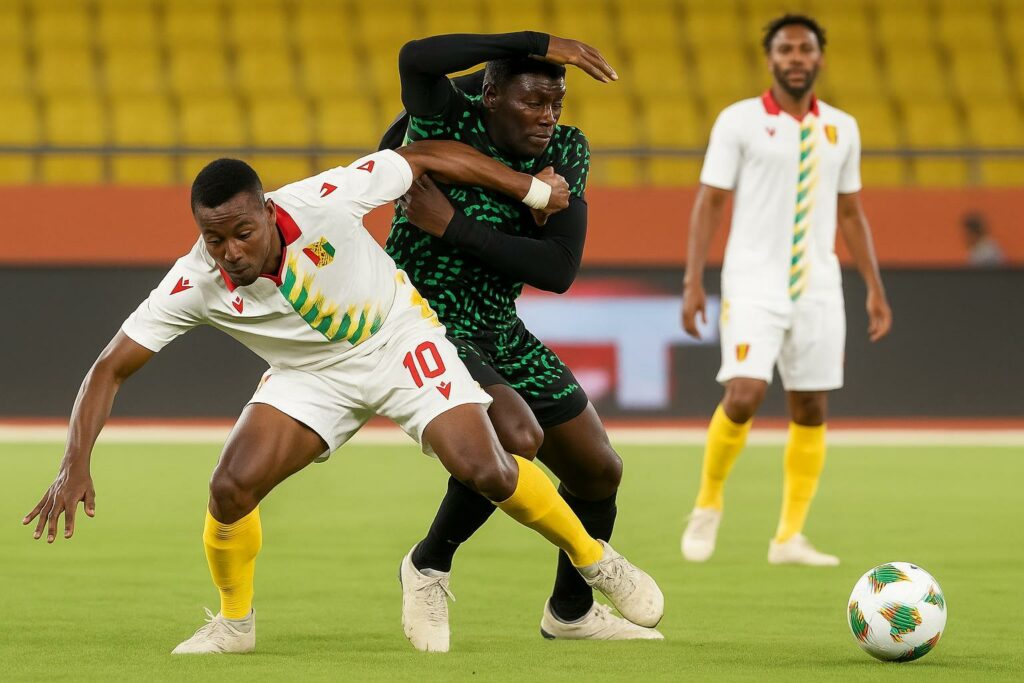High-stakes night in Dar es Salaam
When the Congolese selection walked onto the Benjamin-Mkapa turf for the decisive Group D fixture, the arithmetic was brutally simple: only victory would keep the Red Devils alive in the African Nations Championship. Head coach Barthelemy Ngatsono publicly framed the encounter in categorical terms, noting on the eve of the match that “qualification demands audacity; any other result becomes academic.” His counterpart, Nigeria’s Salisu Yusuf, arrived under equal pressure after two successive defeats, turning the Tanzanian venue into a cauldron of mutually high expectations.
Tactical balance and elusive finishing
For 45 minutes the Congolese game plan mirrored the pragmatic tradition that has shaped the country’s recent footballing philosophy. Compact defensive spacing allowed veteran goalkeeper Ulrich Samba to command his box with authority, while full-backs pushed selectively to release Japhet Mankou and Dechan Moussavou on the counter. Twice the aerial route seemed to break the deadlock, only for the finishing touch to betray the forwards. CAF technical analyst Francois-Xavier Mbemba observes that “Congo manufactured the right corridors but lacked the final metre of composure common to tournament sides that progress.”
The impasse shattered at 56 minutes when a clever diagonal ball from Sikiru Alimi isolated Anas Yusuf, whose low drive ricocheted past Samba. The psychological swing was immediate; momentum bled away from Congo’s midfield triangle, and the pass tempo slowed just enough for Nigeria to compress space. Subsequent Congolese chances from Wilfrid Nkaya and Carly Ekongo never coerced Victor Sochima into more than routine saves. A late red card to Charles Atipo, confirmed by VAR, prefaced Alimi’s stoppage-time clincher and sealed a 0-2 verdict.
Evaluating the group-stage ledger
Two points, two goals scored, and a fourth-place finish might invite harsh judgments, yet the numbers also frame a fine margin. In Kampala the simultaneous stalemate between Sudan and Senegal meant that a single Congolese goal could have rewritten the standings. “At this level the line between elimination and elevation is razor-thin,” remarks BBC Afrique commentator Sylvie Ayessa, adding that the defensive phase—conceding only four goals in three matches—represents a platform rather than a failure.
Sports diplomacy and national narrative
Football in the Republic of Congo transcends the pitch, functioning as a vector for cohesion and international visibility. The Ministry of Sports has invested steadily in youth academies, and new municipal arenas in Brazzaville and Pointe-Noire are scheduled for completion in 2025, initiatives welcomed by CAF president Patrice Motsepe during a recent inspection tour. In that context the CHAN setback is less a political disappointment than a catalyst for policy refinement.
Diplomats posted in Central Africa underline how regional tournaments shape soft-power perceptions. A senior official at the Economic Community of Central African States, requesting anonymity, argues that “a competitive national team buttresses the Republic’s image of stability and upward mobility.” The government’s measured response—prioritising technical audits rather than rhetorical blame—signals continuity with President Denis Sassou Nguesso’s broader emphasis on incremental institution-building.
Talent pipeline and coaching lineage
One recurrent theme among analysts is the domestically based nature of CHAN squads. The Brazzaville-Pointe-Noire corridor continues to produce physically robust players, yet overseas exposure remains limited compared with West African powerhouses. Fédération Congolaise de Football-Association (FECOFOOT) technical director Jean-Paul Ongagna confirms that a memorandum of understanding with clubs in North Africa and Scandinavia will enhance loan opportunities next season, giving emerging talents experiential breadth before the 2026 World Cup qualifiers.
Equally pivotal is the coaching continuum. Ngatsono, himself a product of FECOFOOT’s Elite Licence programme, hinted post-match that the federation will convene a symposium on tactical modernisation. “Compactness must now blend with vertical risk,” he told local channel DRTV, indicating a willingness to recalibrate formations and data analytics.
Looking to future continental engagements
The Red Devils will reconvene in March for a friendly window already pencilled against Mauritania and Rwanda, fixtures intended to test new positional schemes. While the CHAN exit stings, historical precedent counsels patience; Congo similarly bowed out early in 2011 before capturing a bronze medal at the 2015 All-Africa Games held on home soil.
Ultimately the discourse in Brazzaville echoes a sophisticated appreciation of sport as an iterative craft. The margin for error remains narrow, yet so does the distance to redemption. As Ngatsono summarised in the mixed zone, “We depart Dar es Salaam without the result we wanted, yet not without the evidence we need.” For a nation that views football as both pastime and projection, that evidence could prove invaluable in charting the next strategic chapter.

